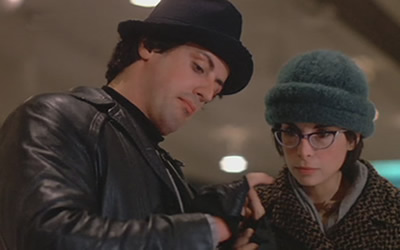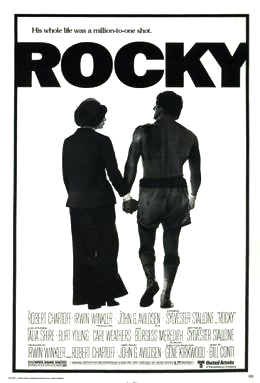ROCKY (1976)
On this Independence Day, it seems appropriate to look back at a film that reads as a love letter to America as we see our nation as: pugnacious, not too sophisticated but with grit and and a good heart and a fierce determination. Rocky still holds a place in many people's heart and it is easy to see why: it speaks to the idea of 'going the distance', a theme that hit hard in America's Bicentennial and which still holds sway now.
Rocky Balboa (writer Sylvester Stallone) is a low-rent boxer and hired muscle for local loan shark Gazzo (Joe Spinelli). Rocky despite his boxing prowess is actually too gentle and kind to be ruthless with those whom Gazzo orders roughed up. Rocky has no prospects: about to turn thirty, his boxing career as 'The Italian Stallion' hasn't gone anywhere. Moreover, local gym owner/impresario Mickey (Burgess Meredith) throws Rock out of his gym.
Rock is thought by everyone he meets as a 'bum', one who won't go anywhere. This wounds him inside but he does not want to show it. His only concern is in winning the heart of painfully shy pet shop salesgirl Adrian (Talia Shire), who lives with her brother Paulie (Burt Young). Paulie and Rock know each other and with some pushing from the abusive and erratic Paulie a genuine romance blossoms between Adrian and Rocky.
 It's here that a surprising bit of luck hits Balboa. Heavyweight boxing champion Apollo Creed (Carl Weathers) has a major fight scheduled on New Year's Day for a Bicentennial celebration but the scheduled fighter has to pull out. Desperate for a replacement, Creed decides to find an unknown Philadelphia fighter as a gimmick. Who better to fight on the two hundredth anniversary of America's founding than some boxer called 'The Italian Stallion'?
It's here that a surprising bit of luck hits Balboa. Heavyweight boxing champion Apollo Creed (Carl Weathers) has a major fight scheduled on New Year's Day for a Bicentennial celebration but the scheduled fighter has to pull out. Desperate for a replacement, Creed decides to find an unknown Philadelphia fighter as a gimmick. Who better to fight on the two hundredth anniversary of America's founding than some boxer called 'The Italian Stallion'?Balboa at first thinks he will be merely Creed's sparring partner, but agrees to the fight. With only five weeks to train Balboa agrees to have Mickey as his manager despite their differences. Only one person in Creed's camp realizes that Balboa, unlike Creed, is taking this fight seriously. The night of the fight Creed is in for a rude shock when he realizes Rocky Balboa, this nobody, this bum, this galoot, is not going to go down easy. It soon becomes an actual fight, with one winning the match and one winning his true love.
People who watch and love Rocky focus on many aspects of the film. They focus on the uplifting story or the performances which are now so much part of Americana that they are easily parodied. They focus on the romance between Rocky and Adrian or on the thrilling theme Gonna Fly Now and its use in the training montage, which also are fodder for spoofs.
All that I think does contribute to Rocky's success and which I will touch on a bit later. However, after seeing Rocky again I think one aspect that is not as well-appreciated is a theme the movie has: the power of redemption and resurrection. Rocky begins with very triumphant music, a single theme from one trumpet echoed by another trumpet that almost declare the arrival of greatness. Bill Conti's score makes clear that Rocky Balboa is a champion even though he has nothing to show it.
However, our first sight is an image of Christ, the ultimate redeemer and one who triumphed over the greatest obstacle, a man born in ultimate power, disparaged and mocked who became King of Kings. He looks down on a fight at the Resurrection AC (Athletic Club). It's a blend of the divine and the common, the people worshiped and the people dismissed.
I cannot say whether Stallone's screenplay or director John G. Avildsen planned this out with that particular mindset. I certainly am not comparing Rocky Balboa with Jesus Christ. However, it would be too much of a coincidence for our hero to metaphorically be watched over by another poor man who rose in triumph.
 There is a strong theme of redemption and resurrection within Rocky, a sense that every character wants to go above where he/she is at and be more than what society has deemed them. Rocky wants to show he is not a bum. Adrian wants to be seen as worthy. Paulie and Mickey too want a shot at being more than what they are. Each of them, filled with frustrations and fears, now through Balboa find a chance for greatness.
There is a strong theme of redemption and resurrection within Rocky, a sense that every character wants to go above where he/she is at and be more than what society has deemed them. Rocky wants to show he is not a bum. Adrian wants to be seen as worthy. Paulie and Mickey too want a shot at being more than what they are. Each of them, filled with frustrations and fears, now through Balboa find a chance for greatness.As a side note, perhaps that is why the training montage, particularly with Gonna Fly Now playing, is so inspiring to so many people. I confess to being surprised at my own reaction: I did get misty-eyed as Rocky races through Philadelphia, birthplace of America, looking down on the city with joy, arms raised, knowing that his chance at redemption and personal if not spiritual resurrection is within his grasp.
Gonna Fly Now, which has remarkably few lyrics, echoes Rocky's themes of redemption and resurrection, starting from "Trying hard now" to "getting strong now" and ending with "gonna fly now"
I think that we react so emotionally with this sequence and with Rocky in general because of two things. Point One, we have gotten to know these characters so well, particularly Rocky and Adrian, that we care what happens to them. This is a credit to their performances. As much as Stallone may be derided now, perhaps with some reason, his Rocky performance was quite strong. He makes Rocky a man who is not just a goodhearted tough guy. He also shows us that there is this rage and hurt within him.
We see it after he seemingly turns Mickey down as a manager. As Mickey sadly walks away we hear and see Balboa express his buried pain at being seen as nothing, a loser, a nobody. That sense of despair and fear come at us with full force. Stallone also shows us Rocky as a quite gentle man, self-consciously aware of his educational limitations and even insecurity around a rather plain-looking woman. We end up loving him.
Same goes for Shire's Adrian, who buries her own fears about not being worthy deep within herself. Once she finds that there's at least one person who loves her for her she blossoms, and that evolution makes for compelling viewing.
There really is not a bad performance in Rocky, with perhaps the exception of Thayer David's boxing promoter Jergens. He struck me as a little over-the-top. Meredith's Mickey was effective, particularly when he all but begs Balboa to be his manager. Young too was strong as Paulie, a man who in his own twisted way did care about his sister, but who was too internally loathing to show the good man buried within him.
I don't think Weathers has gotten enough credit for his Apollo Creed, outwardly an egomaniac but a man also driven by his own fears, a fear of losing his status. It's not a stretch to see why his name is that of a god.
Point Two, we identify with the characters in particular with Rocky Balboa. We see ourselves in Rocky, someone who wants his shot and when unexpectedly presented with it, determined to make the most of his moment.
I have long thought that Rocky is so beloved especially by Americans because it is essentially an American story: the idea that through hard work and determination we can achieve greatness even if that greatness is not financial or worldly. In many ways, Rocky Balboa is how Americans see themselves and the country: not sophisticated or graceful or articulate but kind, courageous, compassionate and determined to overcome the odds.
That it came in 1976 when the United States was celebrating two hundred years of existence but at a time when the nation was questioning itself after the twin traumas of Vietnam and Watergate served to enhance the film. Rocky was a reminder of what America is to many: a true land of opportunity whose people fight hard and have a good heart.
Rocky is more an emotional experience, one where the viewer gets caught up in this man's journey to the championship. I do wish they had spent more time on the actual fight and not told us there would be no rematch, but on the whole that is quibbling. Rocky still holds up because to misquote a quote wrongly attributed to Alexis de Tocqueville, "Rocky is great because Rocky is good".
It's impossible not to love Rocky Balboa and Rocky.
DECISION: A-
1977 Best Picture Winner: Annie Hall


No comments:
Post a Comment
Views are always welcome, but I would ask that no vulgarity be used. Any posts that contain foul language or are bigoted in any way will not be posted.
Thank you.